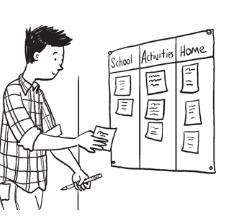
OCTOBER 2019
SHORT STOPS
him practice walking into the kitchen or living room with his back straight and head high, then greeting you while looking you in the eye. He’ll make a good impression on others and feel more self-confident.
Count on counselors
Remind your middle grader that her school counselor is there to help her in all kinds of ways. She might ask the counselor about opportunities that match her interests, such as an engineering competition or a writing workshop. Her counselor can also listen if your tween needs help with issues like stress or relationships.
Proofng around town
Here’s an easy way to show your child why proofreading is important. To- gether, look for signs on highways or buildings that contain punctuation or spelling errors or confusing word- ing. Examples: “Sport’s Store.” “Tables for eating customers only.” Who can find the funniest example — and then tell how to fix it?
Worth quoting
“We will be known by the tracks we leave behind.” Dakotan proverb
Just for fun
Q: I have a neck but no head, and I wear a cap. What am I?
A: A bottle

Brain-friendly studying
Active study strategies like drawing, moving around, and teaching information to others help to cement material in your tween’s brain.They also make studying more fun! Share these techniques.
Make a meme
Encourage your middle grader to create memes inspired by topics she’s studying. For Newton’s laws of motion, she could draw herself as a soccer goalie blocking a shot. This shows that an object in motion (the ball) stops when a force (the goalie) acts upon it. Her caption? "Thanks for the win, Newton!"
Get moving
Combine fitness with studying. Have your tween list six movements, such as lunges, burpees, and toe touches, and number them 1–6. As she finishes studying each page or section, she can roll a die and review out loud while doing the matching exercises (describe the three branches of government as she does three lunges).
Record a podcast
If your child can teach a concept to someone else, that means she really understands it. Suggest that she record a podcast explaining an algebraic formula and share it with a classmate, for example.
Idea: She and her friends might make a group podcast interviewing each other about a historical event or science lab.
A successful juggling act
Middle graders juggle classes, responsi- bilities at home, and activities. Help your tween keep all those balls in the air with this system.
Sort tasks. Each week, have your child create a three-column chart for School, Activities, and Home. Then, he could list obligations: “French essay due Thursday” under School, “Get supplies for cross-country car wash Saturday” under Activities, and “Do laundry” under Home.
Use time wisely. Your tween can choose tasks to match his pockets of time. For instance, if you say you’ll take him to buy car-wash supplies in 10 minutes, he might sort his laundry in that small time slot. Then, maybe he’ll start on his essay when he gets home and has an hour before dinner.

Effective expectations
Setting a high achievement bar for your middle schooler will inspire him to leap high. Follow these steps to put realistic expectations in place.
- Decide what’s doable. Perhaps your child got a C in English last year. Rather than expecting him to earn an A this year, tell him you expect him to bring up his grade.
- Focus on what matters. Keep communication clear by saying exactly what you mean. If your middle grader wants to quit the debate team, you might say, “I expect you to stick to your commitments” rather than “You have to do debate.” That means he’ll need to finish the competition season, but he can switch activities next semester if he still feels the same way.
- Handle setbacks. Part of meeting expectations involves making adjustments. Let your tween know not to be discouraged by one low grade or one challenging debate. Have him ask his teacher how a low score will affect his average, then make a plan to raise it. Or he could plan to spend extra time practicing for his next debate.
Parent To Parent
When my son Rory was younger, he’d spend hours playing outside with his friends. Now that he’s older, he and his buddies would rather play video games.
OUR PURPOSE
To provide busy parents with practical ideas that promote school success, parent involvement, and more effective parenting.
Resources for Educators,a division of CCH Incorporated
128 N. Royal Avenue • Front Royal, VA 22630
800-394-5052 • rfecustomer@wolterskluwer.com
www.rfeonline.com
ISSN 1540-5540
© 2018 Resources for Educators, a division of CCH Incorporated
Are we there yet?
Arizona, Missouri, Louisiana…does your child know where each state is located? Help her explore geography by playing this game.
Materials: large U.S. map, paper, pencil, scissors, hat, game tokens, die
Ask your middle grader to list all the states’ names on a sheet of paper (she can refer to the map) and cut them apart to make 50 slips. Put the slips in a hat, and let each family member pick one.
Place the U.S. map on the floor, and have each person put a token on the state you live in. Then, take turns rolling a die and moving that number of states — with the goal of reaching the state she drew. The first player to land on her state wins.
Q and A
The importance of integrity
Q: I’ve heard that some students cheat on tests by looking up answers on their phones. How can I keep my daughter from doing something like this?
A: Tweens may not consider “e-cheating” to be as serious as copying from a classmate’s paper. Explain to your daughter that any type of cheating is wrong and that you consider honesty more important than high grades. Role-play what to say if a classmate asks her to cheat, perhaps by texting answers. For instance, she could say, “I like to do my own thing” or simply “No thanks.” She’ll feel good about doing what’s right. Also, remind her to obey school rules for technology use like leaving her phone at home or in her locker. This will help her avoid the temptation to cheat and make it easier to resist pressure from others.
- Welcome to Oak Middle School
- About Us
- Forms & Information
- Mental Health & Wellness Resources
- Athletics/Sports
- Activities & Clubs
- Calendars
- Communications
- Oak Middle School Student Handbook 2023-2024
- Resources
- Media Center
- Nursing/Health Office (opens in new window)
- Faculty & Staff
- Team/Classes 2023-24
- Lunch Menu (opens in new window)
-
Policies & Procedures
- iPad License Rules
- SPS Concussion Policy (opens in new window)
- Prevention Education Regarding the Use of Alcohol, Tobacco/Nicotine, and Drugs by Students (opens in new window)
- Prohibition of the Use of Alcohol, Tobacco/Nicotine, and Drugs by Students (opens in new window)
- Report Card Habits of Work and Learning (HOWLS) Rubics
- Accessing Trimester Grades on the PowerSchool Parent Portal
- Supply Lists
- Oak Site Map
- Work Permits
This site provides information using PDF, visit this link to download the Adobe Acrobat Reader DC software.
